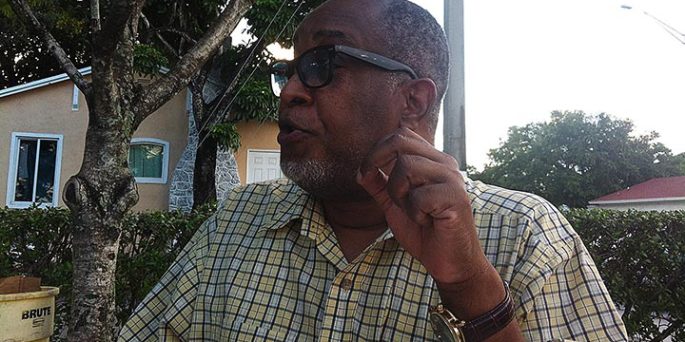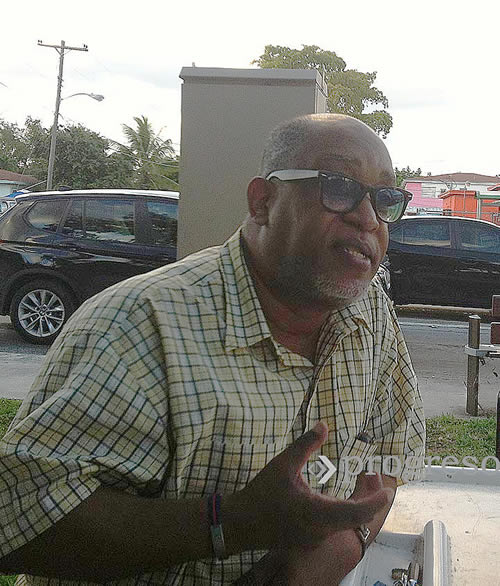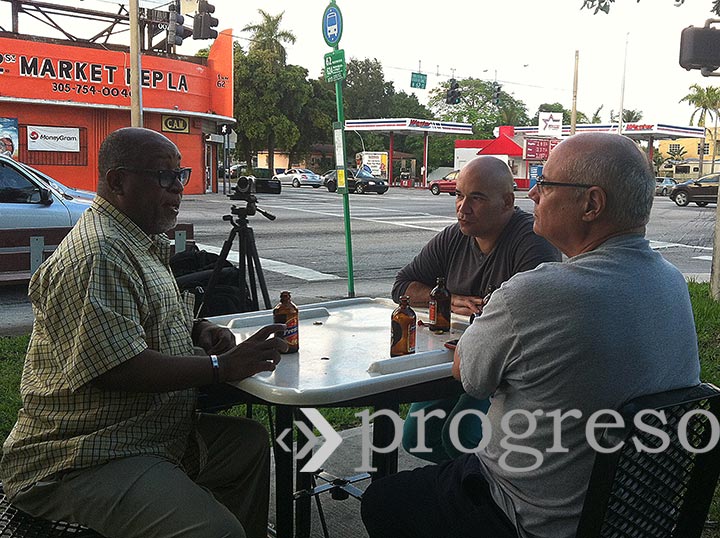
New law could help Haitians… but how many?
MIAMI — The Obama administration recently announced that Haitian citizens eligible for permanent residence in two years could sit out the process in the United States, not in Haiti. This measure is part of a program of family reunification that will be implemented in early 2015.
The Department of Homeland Security will allow relatives eligible for the Haitian Family Reunification Parole Program, if they are on U.S. territory and qualify for an immigrant visa, to wait for two years, with a work permit and residence.
That program has some points in common with the Cuban Adjustment Act, because, if the Haitian relative holds (or qualifies for) the family reunification visa, he/she may — once placed under parole — obtain the benefits of work permit and residence at the times established by the law.
At present, some 100,000 Haitians will benefit by the measure.
Progreso Weekly interviewed Jean-Robert Lafortune, president of the Haitian-American Grassroots Coalition, who for many years has been one of the people who has worked the hardest in favor of the integration of Haitian immigrants, establishing a dialogue with the authorities to attain benefits for his community.
 “Water or beer?” Thus began the interview in the heart of Miami, in what is known as Little Haiti. “Beer,” I responded instinctively, and in a park at 62nd and North Miami Avenue, surrounded by Haitian symbols, the sound of creole and a glass of cold beer (“Haitian, of course,” said Jean-Robert), we began a dialogue about the hopes of a community that is often alienated and excluded from the political map of this city.
“Water or beer?” Thus began the interview in the heart of Miami, in what is known as Little Haiti. “Beer,” I responded instinctively, and in a park at 62nd and North Miami Avenue, surrounded by Haitian symbols, the sound of creole and a glass of cold beer (“Haitian, of course,” said Jean-Robert), we began a dialogue about the hopes of a community that is often alienated and excluded from the political map of this city.
“We are pleased, that’s undeniable. At least, the Obama administration has approved a reform that enables us Haitians to enjoy family reunification and our loved ones to wait here, with us and working.
“But this mini-reform is insufficient. Recently, we had a meeting with representatives of the Department of Homeland Security and the U.S. State Department and we asked them to tell us how these measures would be implemented.
“I told them that it is an important reform, but that it leaves room for many people to benefit. More than 100,000 Haitians are waiting for this measure and I don’t understand why the administration is talking of only 5,000 the first year. Their answer was that they’re going to study how that would work.
“The impression I get is that they don’t know how to implement it. Maybe by the end of the year we’ll learn of a regulation that explains to the public how the law can benefit them or how they can take advantage of it.
“This law is similar to the Cuban Adjustment Act, but only in some aspects. It consists of a program of visas for the relatives of Haitian residents or those who are U.S. citizens, but the difference is that, instead of waiting one year and one day to get our papers, we Haitians would have to wait two years.
“Although [the applicants] could get work permits if they are on U.S. territory during those two years, the truth is that this law was turned into a half-measure, sabotaged by someone in the State Department who is a member of our community.
“I won’t name names, but it regrettable that the Haitian experts are so absolutely disconnected from the groups of community influence.”
In this regard, Cheryl Little, director of Americans for Immigrant Justice, said that “We are grateful that the administration has […] done the right thing. I had hoped that [the law] would not be as restrictive as it seems to be, in terms of eligible Haitians joining their loved ones here, but it is obvious that it is going to benefit a group of Haitian families who have been waiting for this ever since the earthquake.”
The 2010 earthquake in Haiti was one of the worst natural disasters to affect the region. Three hundred thousand Haitians died and a like number were injured. A million and a half people lost their homes. The announcement of this program is a relief, considering the failure of the immigration reform proposed by Obama.
Jean-Robert is enjoying the conversation. At one point, he becomes unaware of the tape recorder and the wailing of the ambulances that drive past. “You can see why I called you to my office,” he tells me.
“Haitian groups have much support in different social spaces,” he continues. “The Latino groups in Washington, the African-Americans in Mississippi, the Jews, the Black Caucus, all of them have helped us. Many people have intervened so we could come to this moment, so we could ask the President to pass a just law.
“The support we’ve received has been national and local, from California to the District of Columbia, from west to east. I’m speaking about a sustained, constant effort.
“I must tell you that I’m proud. I’ve been one of the people who has worked the hardest to get here. I am not the type of person who wants to be in the spotlight; I’m just one more worker. But I engaged in this struggle in 2010, when I did research on the Temporary Protected Status, or TPS.
“Back then, I introduced the idea of this law, of the need to normalize the status of Haitians’ relatives. During those years I spoke a lot about the idea with the barons in Washington. Benefiting my community has been my struggle.
“After the earthquake, I defended the humanitarian side. Many of our relatives were (and are) dying at the hands of the police, of military groups, of government agents or, what’s sadder, lamentable accidents when they board boats to come here. They also die because of the unsanitary conditions and the bad public-health system.
“In Haiti, we don’t have a well-equipped health care system for certain diseases. In fact, friends and relatives have died waiting for Obama to sign this law.
“This measure is a palliative. Had the immigration reform proposed by the Obama administration been approved, a problem that affects Haitians and millions of undocumented immigrants of many nationalities would have been solved.
“By defining as limited the number of Haitians who could benefit from the law, the pro-immigration-reform activists have not raised a fuss.”
In this sense, Steve Forrester, an activist in Haitian immigration, agrees with Jean-Robert.
“It is a very limited program,” Forrester says. “We don’t know how many people it will cover and much will depend on the speed with which it is applied.”
Evidently, Jean-Robert, though proud of the work he has done, feels unsatisfied. I suspect there is a lot behind the effort and ask him, “In all these years, who has hindered you?”
“I would say bureaucratic groups inside each administration,” he answers. “They are immovable sectors that remain, as governments go by. They go from Clinton to Bush and from Bush to Obama. We don’t have much support in Washington’s intermediate bureaucracy, so our work is sometimes doubled.
“For example, when Clinton approved a law that supposedly would benefit 50,000 Haitians, at the end it benefited only 10,000.
“I don’t think that this law will open the door to future measures that will benefit my community. I believe that we could expand our help to the TPS groups. If the reform anticipated by Obama materializes, some of the protected groups could benefit more.
“In 2010, I was told that some protected groups would be accommodated and that protocol would be followed so that Haitians with a temporary status could benefit. So far, we’re still waiting.
“This law is a step forward, no doubt, but we don’t know how many will benefit — whether the more than 100,000 who qualify or the first 5,000 that we’ve been promised. Right now, everything is much too slow and uncertain.”
“Slow and uncertain.” Those words have a grim resonance when one thinks about a community that, in addition to its poverty and the plunder perpetrated by the successive Duvalier dictatorships, has been flogged by natural disasters that have left it in the most abject misery, ignored by the international community.
Álvaro Fernández, editor of Progreso Weekly, interrupts us and asks: “One final question. To the Haitian community, is President Obama positive or negative?”
Jean-Robert sighs or smiles, or both, looks around and finally laughs.
“As an observer of public opinion, I see that there is a small group that supports Obama on everything. Even so, about six years ago, I posited that, the way the affairs of state were being managed, his administration would enter a crisis. The fact is that, in his administration, many heads butt each other constantly.
“When we were at the White House to negotiate the TPS, we could see who was on our side and who wasn’t. At that time I thought, ‘This is no way for a government to talk about policies intended to solve real problems.’ The game had a foretold ending.
“In 2011, the administration called on different Haitian groups of influence to seek a solution to the Haitian electoral crisis. Groups and individuals with many and varied points of view participated in the gathering.
“I recalled that, in the days of Baby Doc, we had peace in Haiti, but it was the peace of the graveyard. So I felt obligated to make a press statement asking if the administration would allow us to speak about the real situation in Haiti, if it would allow us to discuss our problems in depth.
“That’s difficult. The rulers and their administrations play with our needs and abandon us because of electoral maneuvering or political games. What’s worse, they give us poor advisers. This law is good and incomplete, but at least gives hope to many Haitian families.”


